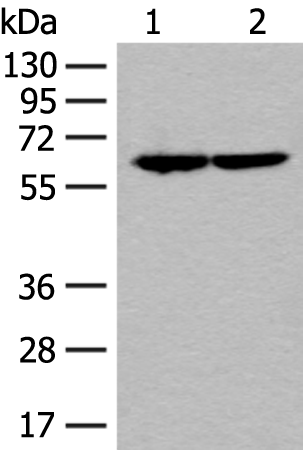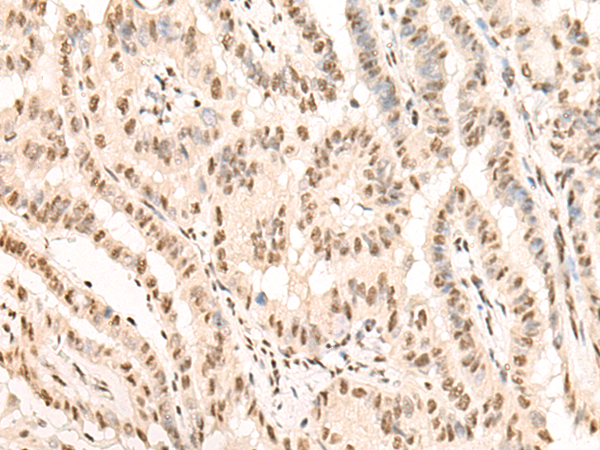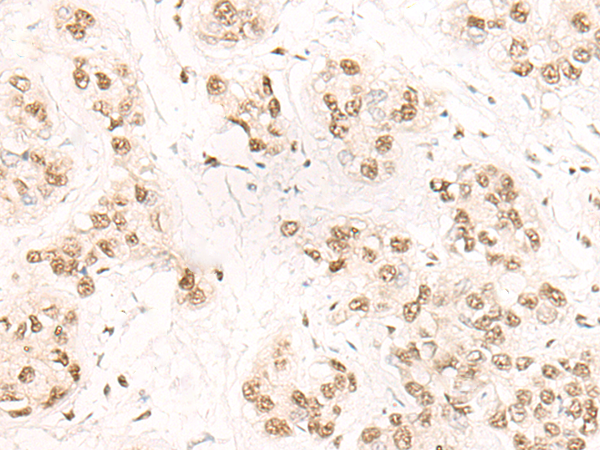


| WB | 咨询技术 | Human,Mouse,Rat |
| IF | 咨询技术 | Human,Mouse,Rat |
| IHC | 1/30-1/150 | Human,Mouse,Rat |
| ICC | 技术咨询 | Human,Mouse,Rat |
| FCM | 咨询技术 | Human,Mouse,Rat |
| Elisa | 1/5000-1/10000 | Human,Mouse,Rat |
| Aliases | PRP9; PRPF9; SAP61; SF3a60 |
| WB Predicted band size | 59 kDa |
| Host/Isotype | Rabbit IgG |
| Antibody Type | Primary antibody |
| Storage | Store at 4°C short term. Aliquot and store at -20°C long term. Avoid freeze/thaw cycles. |
| Species Reactivity | Human, Mouse |
| Immunogen | Fusion protein of human SF3A3 |
| Formulation | Purified antibody in PBS with 0.05% sodium azide and 50% glycerol. |
+ +
以下是3篇涉及SF3A3抗体的参考文献及其摘要概括:
1. **文献名称**: "Composition and functional characterization of the yeast spliceosomal penta-snRNP"
**作者**: Stevens SW, et al.
**摘要**: 本研究利用抗SF3A3抗体进行免疫沉淀,分析了酵母剪接体penta-snRNP复合物的组成,揭示了SF3A3在pre-mRNA剪接中的关键结构作用。
2. **文献名称**: "SF3A3 phosphorylation as a biomarker of cancer cell sensitivity to splicing inhibition"
**作者**: Lee SC, et al.
**摘要**: 通过Western blot和免疫荧光技术,研究者发现SF3A3抗体检测到的磷酸化水平与癌细胞对剪接抑制剂的敏感性相关,为癌症治疗提供潜在标志物。
3. **文献名称**: "Spliceosome malfunction causes neurodegeneration via R-loop accumulation"
**作者**: Hsu TY, et al.
**摘要**: 该研究采用SF3A3抗体在小鼠脑组织中进行免疫组化,证明剪接体功能障碍导致R-loop积累,进而引发神经退行性病变。
以上文献均通过SF3A3抗体探究其在剪接机制、疾病机制或治疗中的应用。如需具体年份或期刊信息,可进一步补充检索条件。
The SF3A3 antibody targets the SF3A3 protein, a key component of the SF3a complex within the U2 small nuclear ribonucleoprotein (snRNP) of the spliceosome. The spliceosome mediates pre-mRNA splicing by recognizing intron-exon boundaries and catalyzing intron removal. SF3A3. along with SF3A1 and SF3A2. forms the SF3a subcomplex critical for stabilizing U2 snRNP binding to the branch site during spliceosome assembly.
Antibodies against SF3A3 are widely used in research to study spliceosome dynamics, RNA splicing mechanisms, and their dysregulation in diseases. Aberrant splicing linked to SF3A3 mutations or altered expression is implicated in cancers, neurological disorders, and developmental defects. For example, SF3A3 overexpression has been observed in certain tumors, correlating with abnormal splicing events that promote oncogenesis.
These antibodies enable techniques like Western blotting, immunofluorescence, and immunoprecipitation to analyze SF3A3 expression, localization, and interactions. They also support drug discovery efforts targeting spliceosome components, as SF3A3 inhibitors are explored for anticancer therapies. Notably, SF3A3 antibodies help validate the efficacy of small molecules like pladienolide derivatives that disrupt spliceosome activity.
Overall, SF3A3 antibodies serve as essential tools for elucidating splicing biology and developing therapeutic strategies for splicing-related pathologies. (Word count: 199)
×